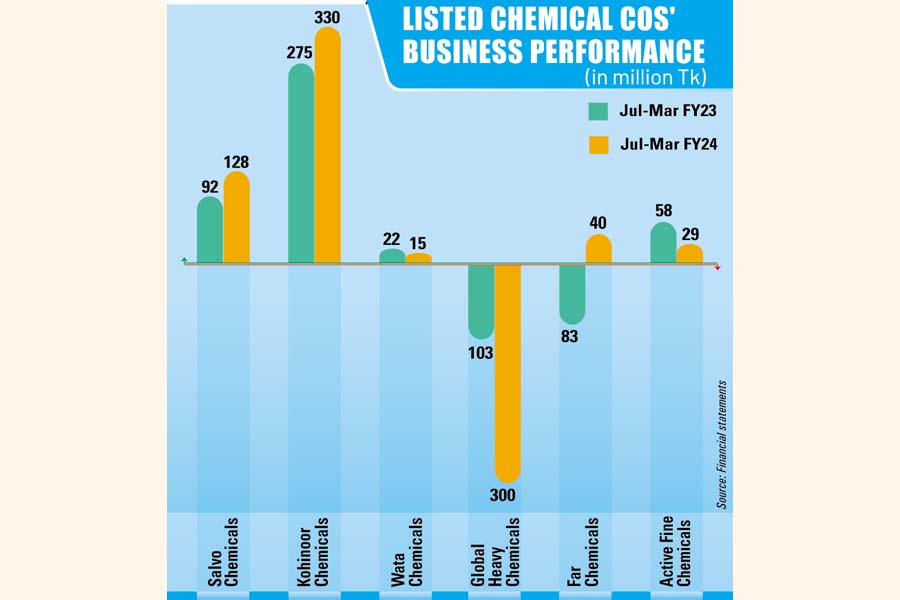
Published :
Updated :

Most listed chemical manufacturers are struggling to make profits since the pandemic while lingering macroeconomic challenges, stronger dollar and runaway inflation have continued to adversely affect their business.
Among the six organisations listed in the stock market, only Kohinoor Chemicals maintained a profit growth, while others failed to secure expected income in the nine months through March this year.
The firms, which sell products mainly to local small and medium enterprises (SMEs), continue to face a decline in sales as domestic consumption dropped sharply amid inflationary pressure. Many small companies have been running operations partially to survive, while some others have suspended operations after the outbreak of the Russia-Ukraine war in February 2022.
Industry insiders blame the high dollar-taka exchange rate, difficulties in opening letters of credit and a decline in production for the dismal performance of listed chemical manufacturers. Rising interest rates add to the financial woes, increasing business costs.
The interest rate of Treasury bonds recently jumped to a 15-year high of 12.75 per cent while bank deposit and lending rates also started climbing after the Bangladesh Bank scrapped the SMART (six month moving average rate of Treasury bills) formula to make interest rates fully market-based.
The losses of Global Heavy Chemicals - a manufacturer and distributor of Sodium Hydroxide (Caustic Soda), Chlorine, and other chemical products - almost tripled year-on-year to Tk 300 million in the nine months through March this year.
"Cost of sales increased significantly owing to the concentrated effect of price escalation of raw materials and frequent increase in the dollar rate in addition to the unusual hike of utility bills," said the company in its earnings notes.
Although raw material prices eased a bit in the recent months, many companies are still facing challenges in opening letters of credit for imports due to the dollar crisis.
Global Heavy Chemicals said that despite a rise in sales in the nine months through March this year, compared to the same period a year ago, the company could not avoid losses as operating fixed cost, such as depreciation, labour cost and finance cost were higher.
"If necessary steps are not taken to improve the production efficiency, the company may struggle to continue the business profitably," said the auditor of Global Heavy Chemicals.
Wata Chemicals, a producer of a variety of acids, witnessed a 32 per cent year-on-year decline in profit to Tk 15 million in the nine months through March this year.
Company secretary Shamsul Huq said the demand for their products in various sectors was down, leading to a lower profit.
Wata Chemicals' sales plummeted 31 per cent year on year to Tk 536 million in the nine months through March this year.
Also, finance expenses were up during the period from the corresponding period of the last year because of higher interest rates.
However, selling and administrative costs were contained, said the company secretary.
Wata Chemicals produces and sells alum and zinc sulphate, magnesium sulphate, sulphuric acid, basic chrome powder, and linear alkyl benzene sulphonic acid.
Sulfuric acid is mostly used in production of fertiliser, in refining water and petroleum and in manufacturing other chemicals, such as hydrochloric acid, nitric acid, sulfate salts, synthetic detergents, and dyes and pigments.
Active Fine Chemical reported that its income halved year-on-year to Tk 29 million in the nine months through March this year. The company was sent to the "Z" category in March this year as the company failed to hold the annual general meeting timely.
Its sponsor-directors jointly hold only 12.04 per cent shares, much lower than the minimum shareholding requirement of 30 per cent.
Meanwhile, Far Chemicals managed to return to profit, with an income of Tk 40 million in the nine months through March this year, after its merger with export-oriented yarn-spinning company SF Textile in January last year.
The company suffered a loss of Tk 83 million in the same period the year before.
In fact, the company had been in the red, counting an aggregated loss of Tk 363 million in the three financial years to FY23.
Far Chemicals took over all assets and liabilities of SF Textile Industries. SF Textile Industries is a 100 percent export-oriented yarn spinning company that has been in operation since 2016.
"The company returned to profit after the merger as production capacity jumped to 75,600 spindles from 33,000 spindles," said Abu Talha, general manager of Far Chemicals.
Salvo Chemicals, which produces sulphuric acid, sulphate, battery-grade water, and glucose, has reported a 39 per cent higher profit to Tk 128 million for the nine months through March this year, compared to a year earlier, riding on higher sales.
Its sales surged 46 per cent year-on-year to Tk 1.71 billion during the period.
In FY23, Salvo's profit plunged 26 per cent year-on-year to Tk 96 million.
Kohinoor Chemicals, one of the oldest manufacturers of soaps, cosmetics, and toiletries in the country, could maintain its growth trajectory in this adverse business climate, riding on popularity of its products among the middle class and rural people.
Kohinoor saw a 16 per cent year-on-year growth in sales to Tk 4.65 billion while its profit surged 20 per cent to Tk 330 million in the nine months through March this year.
Most of the products of Kohinoor Chemicals are known by the legendary brand name Tibet. The company's other brands are Sandalina, Ice Cool, Fast Wash and Bactrol.
babulfexpress@gmail.com


 For all latest news, follow The Financial Express Google News channel.
For all latest news, follow The Financial Express Google News channel.